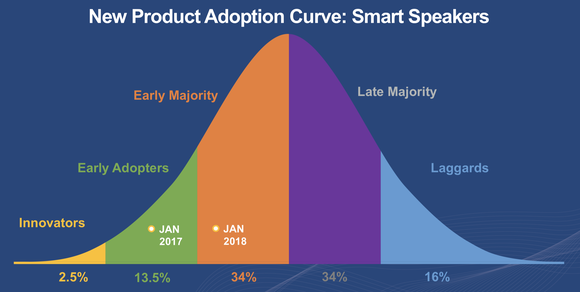Slowly but Surely, Smart Speaker Adoption Continues to Rise
The smart speaker market continues to be among the most promising spaces within consumer electronics in years. NPR and Edison Research released a fresh report this week on the growing trend among U.S consumers. The report comes six months after their prior report. The results are derived from an online survey of 909 U.S. adults. Approximately 18% of Americans now own a smart speaker, or roughly 43 million people. That's up from 16%, or 39 million people, in January.
Here are some other notable findings in the report that have broad implications for Amazon.com (NASDAQ: AMZN), Alphabet (NASDAQ: GOOG) (NASDAQ: GOOGL) subsidiary Google, and Apple (NASDAQ: AAPL), among other smart speaker players.

Image source: Amazon.
Survey says
The market is well into the early mainstream phase of adoption. The report considers first adopters to be those who have owned a smart speaker for a year or more, and this group represents around 26% of the installed base. The remaining 74% of smart speaker owners would fall into the early mainstream category, having owned their devices for less than a year.
Usage among these two groups is also on the rise. Nearly half of first adopters (48%) say they currently use smart speakers "more often" now compared to when the first month they owned one. Among early mainstream adopters, over half (54%) say they use the devices "more often."

Image source: NPR/Edison.
The data also strongly suggest that once a consumer buys one smart speaker, they buy more over time: 55% of first adopters own two or more, while 46% of early mainstream adopters own two or more. That suggests that the longer a person owns a smart speaker, the more inclined they are to purchase more to place in other rooms around the house. The purchase intent data supports this notion too, with 44% of first adopters say they're planning to buy another smart speaker; 58% of early mainstream adopters say likewise.

Image source: Google.
By offering a lineup of affordable smart speakers, Amazon and Google are best positioned to grow their respective installed base, as it would cost a fortune to put an Apple HomePod in every room.
Smart-home technology applications are garnering considerable interest. Of those interesting in buying another smart speaker, using the device to "control appliances or lights in more rooms of your house" ranks as the top reason, with 65% of this subset expressing interest. Getting up to speed with the news is also a popular use case, with approximately 70% of each adopter category listening to news on smart speakers; 37% of smart speaker owners listen to two hours of news each week.
Commerce and advertising
Voice commerce is also emerging as a promising opportunity for companies. Earlier this year, Google announced a new program called Shopping Actions that would help it challenge Amazon in voice commerce. In terms of consumer behavior, it's still less common compared to listening to music or getting news, but the opportunity is still there.
Behavior | First Adopters | Early Mainstream |
|---|---|---|
Added an item to your cart so you could review it later for purchase | 26% | 25% |
Researched an item you might want to purchase | 23% | 37% |
Re-ordered an item you have previously purchased | 22% | 16% |
Ordered a new product you have not previously purchased | 17% | 17% |
Data source: NPR/Edison.
Re-ordering known items is much more likely than buying new products, as it's hard to conduct product research using a voice interface. This is partially why Amazon hopes you have an Echo in your kitchen, so you can easily ask Alexa to fill up your fridge and have those groceries delivered with Amazon Fresh.
Consumers are also increasingly open to advertising, with a whopping 81% of owners either saying they "like" or "don't mind" brand-sponsored features. A solid 67% of respondents would be open to product endorsements delivered via smart speaker. That's good news for Google.
There aren't any groundbreaking revelations in the report. Rather, the data mostly serve as more evidence of how sustained smart speaker adoption is. This is a booming product category. Too bad Apple might miss out on smart speaker growth this year, according to Canalys.
More From The Motley Fool
John Mackey, CEO of Whole Foods Market, an Amazon subsidiary, is a member of The Motley Fool's board of directors. Suzanne Frey, an executive at Alphabet, is a member of The Motley Fool's board of directors. Evan Niu, CFA owns shares of Apple. The Motley Fool owns shares of and recommends Alphabet (A shares), Alphabet (C shares), Amazon, and Apple. The Motley Fool has the following options: long January 2020 $150 calls on Apple and short January 2020 $155 calls on Apple. The Motley Fool has a disclosure policy.

 Yahoo Finance
Yahoo Finance 